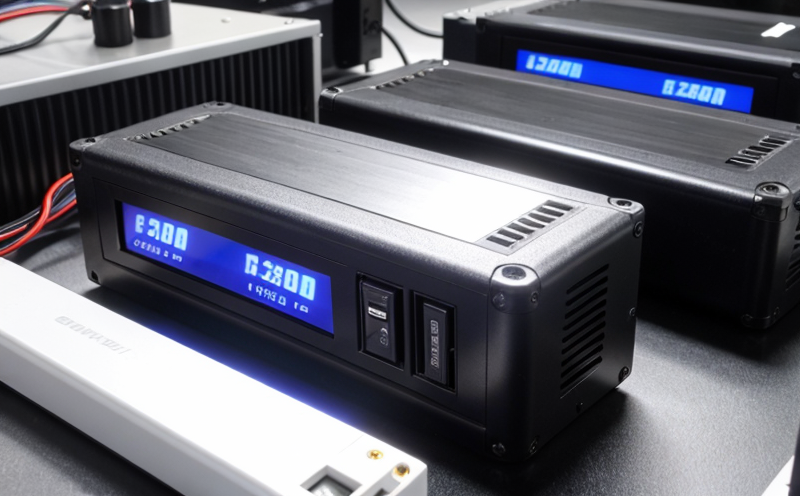GB/T 34013 Lithium Battery Performance Testing Under Low Temperature Conditions
The GB/T 34013 standard is a critical benchmark in the industry, providing a rigorous framework for assessing the performance of lithium batteries under low-temperature conditions. This test ensures that batteries meet stringent safety and reliability requirements, which are essential for various applications including automotive, aerospace, and consumer electronics.
Low temperature testing is crucial because it simulates real-world scenarios where batteries may operate in cold environments. The standard defines specific procedures to evaluate the battery's capacity retention, internal resistance, and impedance under these conditions. This process ensures that the batteries perform reliably even when exposed to temperatures as low as -20°C or lower.
The testing protocol outlined in GB/T 34013 involves placing fully charged lithium batteries into a controlled temperature chamber. The batteries are then allowed to equilibrate for a specified period before the tests begin. During this time, the batteries are monitored closely to ensure they reach thermal equilibrium. Once equilibrated, the batteries undergo various performance assessments.
A key aspect of GB/T 34013 is its focus on capacity retention. This metric measures how much charge remains in the battery after being subjected to low temperatures for a defined period. The standard specifies precise methods for discharging and recharging batteries at specified rates while maintaining accurate temperature control throughout the process.
Impedance measurement is another critical parameter evaluated under GB/T 34013. Impedance provides insight into the internal resistance of the battery, which can degrade over time and affect performance. The standard outlines procedures for measuring impedance using specialized equipment to ensure accurate readings. These measurements help identify any potential issues that could arise due to temperature-induced changes in the battery's chemistry.
Internal resistance is also a significant factor in determining a battery's overall health under cold conditions. High internal resistance can lead to reduced performance and increased self-discharge rates, which are particularly problematic for batteries operating in low-temperature environments. The testing protocol includes detailed instructions on how to measure internal resistance accurately using appropriate instruments.
The GB/T 34013 standard also emphasizes the importance of maintaining precise temperature control during all phases of the test. This ensures that results are consistent and reproducible, allowing for accurate comparisons between different battery models or batches. The use of high-precision thermometers and environmental chambers is recommended to achieve this level of accuracy.
For quality managers and compliance officers, adhering to GB/T 34013 provides peace of mind by ensuring that batteries meet the highest industry standards for safety and reliability under cold conditions. This standard is widely recognized in both domestic and international markets, making it an essential tool for maintaining product integrity.
R&D engineers benefit from using this standard as it guides them through the development process, helping to identify potential weaknesses early on and refine designs accordingly. By incorporating GB/T 34013 into their testing protocols, R&D teams can ensure that new battery technologies perform consistently across a wide range of temperatures.
For procurement professionals, ensuring compliance with this standard helps them select suppliers who meet stringent quality criteria. This reduces the risk of purchasing substandard batteries and ensures consistency in performance across all components used in final products.
Industry Applications
- Automotive: Ensuring reliable power supply for electric vehicles (EVs) and hybrid cars operating in cold climates.
- Consumer Electronics: Guaranteeing extended battery life and performance for devices like smartphones, laptops, and wearable tech used in winter conditions.
- Aerospace: Verifying that lithium batteries meet safety standards for use on aircraft flying at high altitudes where temperatures can drop significantly.
- Military: Providing dependable energy sources for equipment deployed in harsh environments characterized by extreme cold.
| Application | Description |
|---|---|
| Automotive | Ensures reliable power supply for electric vehicles and hybrid cars operating in cold climates. |
| Consumer Electronics | Guarantees extended battery life and performance for devices like smartphones, laptops, and wearable tech used in winter conditions. |
| Aerospace | Verifies that lithium batteries meet safety standards for use on aircraft flying at high altitudes where temperatures can drop significantly. |
| Military | Provides dependable energy sources for equipment deployed in harsh environments characterized by extreme cold. |
Customer Impact and Satisfaction
The implementation of GB/T 34013 Lithium Battery Performance Testing Under Low Temperature Conditions significantly enhances customer satisfaction by ensuring that products perform reliably in all conditions. This standard helps manufacturers deliver high-quality batteries that meet regulatory requirements, thereby building trust with consumers.
By adhering to this stringent testing protocol, companies can demonstrate their commitment to quality and safety, which is particularly important for industries where reliability under cold conditions is crucial. Customers appreciate the peace of mind knowing that they are using products that have undergone rigorous evaluation before reaching the market.
The results from GB/T 34013 testing also help manufacturers identify areas for improvement in their battery designs and manufacturing processes. This continuous optimization leads to better-performing batteries, which ultimately translates into higher customer satisfaction and loyalty.
Competitive Advantage and Market Impact
The adoption of GB/T 34013 Lithium Battery Performance Testing Under Low Temperature Conditions can provide significant competitive advantages in the market. By ensuring that their products meet or exceed these stringent standards, companies can differentiate themselves from competitors who may not adhere to such rigorous testing protocols.
Customers are increasingly aware of the importance of reliability under various environmental conditions, making compliance with this standard a valuable differentiator. Companies that lead in meeting these standards may attract more customers seeking dependable products and services.
In addition to enhancing brand reputation, compliance with GB/T 34013 can also facilitate easier market entry into regions where regulatory requirements are stringent. This can open up new opportunities for growth and expansion into international markets.





